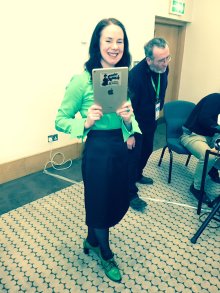I had intended to write one last post to follow up the OER16: Open Culture Conference last month, but the moment passed, the weeks slipped by and I decided I’d left it too late. But then a couple of weeks ago Jim Groom posted a belated OER16 reflections post and I thought dammit, if Jim can do it, so can I!
When I was putting together my OER16 Overview for the eLearning@Ed conference in May I emailed some of our keynotes and delegates to ask if they’d be willing to share some reflections on their experiences of the conference. I got some fabulous and very thoughtful responses that I really wanted to share, so here they are, after much delay and procrastination. Many thanks to everyone who responded.
It’s almost impossible to summarise so many diverse responses but if I can make an attempt…
Many OER16 participants commented on the strength of community that has grown up around open education. This is a mature and diverse community, which encompasses many different perspectives and interpretations of openness. For some open education is about resources, policy, technology, for others it’s about practice. Some are concerned with supporting and sustaining open education at scale across institutions, for others openness is more of a personal ethos. Some focus on the technologies we use to support open education, others are motivated by the potential of openness to address inequality and exclusion. None of these perspectives are mutually exclusive, none are above criticism, and indeed it appears that as a community we are moving towards a much more critical and nuanced analysis of what it means to be open.
As is so often the case Catherine Cronin put this into words much more eloquently than I can
“I feel a collective sense of “moving on” in the open education community, a willingness to tackle some of the more challenging questions about risk, power and inequality.”
Jo Spiller

Jo Spiller by Brian Mather
Educational Design and Engagement, University of Edinburgh
My two highlights were Catherine Cronin’s keynote on participatory culture, the power of open to influence and celebrate change, especially with the focus on the Gay Marriage vote in Ireland. How it can be playful and moving and everyone can contribute to it.
As a counterpoint to this, Sava Singh on the perils of open scholarship “Open wounds: The Myth of Open as Panacea” was really interesting – that open can also become excluding for different demographic groups and also has both great benefits but also great challenges for academics.
Sara Thomas
Wikimedian in Residence, Museums Galleries Scotland
As the Wikimedian in Residence for Museums Galleries Scotland, I usually work alone, or remotely. The opportunity to connect to the wider open knowledge community was fantastic – energising, informative and so very valuable. And we had 4 Residents in a room at once! This, you have to realise, is a rare thing indeed in the world of Wiki. I’ve worked primarily in open culture and heritage for the last 16 months, and one of the growth areas has been in the interface between education and culture…. So #OER16 seemed to me so prescient, so perfectly timed.
Martin Weller
The Open University
The sessions I attended at OER16 demonstrated how the field is maturing, and in many ways moving beyond a narrow definition of OER as content. The potential of OER in fields as diverse as Shakespeare and understanding modern slavery was demonstrated, but so too was the nature of open identity, the type of research we should be undertaking, and the need for open infrastructure. The UK OER conference is now much more of an international one and also much more critically reflective of the nature of openness.
Sheila MacNeill
Glasgow Caledonian University

Sheila MacNeil and Martin Weller by Josie Fraser
One of the things I keep coming back to is Melissa’s description of technical and cultural debt – I am going to try and blog about this but need to think about it a bit more in terms of my political position! But I found her description of them both really useful and thought provoking.
The theme of #oer16 was Open Culture, and it was great to have input from third sector organisations around the potential of open-ness (content, data and practice) outwith the education sector. Catherine Cronin’s opening keynote addressed cultural issues around inequality, culture, participation and open-ness head on. Changing societal, organisational and personal attitudes to open-ness is an ongoing debate in the open education world.
~ A Tale of Two Conferences: #oer16 and #LAK16
Catherine Cronin
National University of Ireland, Galway
I thoroughly enjoyed the conference – the sessions I attended as well as the many conversations over the course of the 2+ days. I feel a collective sense of “moving on” in the open education community, a willingness to tackle some of the more challenging questions about risk, power and inequality. Though there is much work to do, this move towards more critical analysis is heartening.
Rachel Hosker
Centre for Research Collections, University of Edinburgh
It was great. Really refreshing and challenging in a positive way for collections. It was a fantastic opportunity to share ideas and meet people with different perspectives on sharing collections and how we can all do this. I also found it useful as a platform for discussing some of the practical things in collections work that need to be done to make things open for use. As an archivist, working in collections I would encourage others in my sector and profession to go to OER and engage with making collections open.
Maha Bali
Center for Learning and Teaching, The American University in Cairo
As a virtual participant who was also doing OLC Innovate at the same time… I only got a glimpse of what was happening. But what I thought was particularly interesting about OER16 was the challenging of two things:
- Challenging OER as a key mode openness – Catherine Cronin’s keynote, my presentation with Suzan Koseoglu and one by Andrew Middleton and Katherine Jessen tried to move beyond OER as content as being the main form of openness…which was interesting given the title of the conference
- Challenging openness as necessarily a good thing. This again came from Catherine but also Jim and also my session with Suzan. I am sure if Frances Bell presented something it would also challenge that.
I don’t know if this is all normal for OER16… it resonates a little with how OpenEd last year was, but with OpenEd it felt like maybe a majority of attendees were less critical but there was a vocal minority that was critical…
Thank you for embodying true openness in your approach to my virtual participation and Virtually Connecting. We are continually mentioning ALT as one of the organizations that’s supporting us.
Frances Bell
francesbell.com
OER16 was a very friendly conference – with lots of smiling, networking and fun going on. The conference topic Open Culture, expressed through the themes, enabled participants to celebrate and critique openness in the overlapping contexts of cultural heritage and education. The keynote speakers really helped to frame that celebration and critique in conference sessions and informal discussions

by Catherine Cronin, CC BY SA
Stuart Nicol
Educational Design and Engagement, University of Edinburgh
At a high level I felt a little that there was an underlying split between the very technical-orientated view of open and OER (I’m thinking Jim Groom’s keynote around infrastructure & indie-web) and then the very human side (several presentations talking about the self as OER). But thinking of this as less of a ‘schism’ and more of the strands that sit under the OER grouping. Strands that can sit comfortably but that maybe we haven’t quite got to a place where we realise they can sit comfortably together?
I think it maybe comes down to a tendancy to try to simplify; that OER is a policy and/or it’s a repository. But actually it’s a digital sensibility that underpins a very wide range of practices … the specific human and technical implementation of OER will be different in different practice contexts … and it’s likely to change over time.
John Johnson
Radio EduTalk
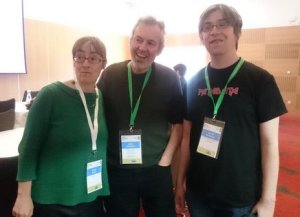
Viv Rolf, John Johnson, David Kernohan by Martin Hawksey
In higher education the idea of open education is now well enough established that the discussions have become quite nuanced. There are a wide range of definitions and directions on the open road. Some look at practical issues around, licensing and searching of resources, others social or technical ideas.
I’ve not seen much evidence that these ideas are penetrating primary or secondary education in Scotland. I do think that open ideas are equally valid here. A good place for school based colleagues to start might be the Scottish Open Education Declaration.
I’ve not got a wide ranging knowledge of the OER world, but it was pretty obvious there are different interpretations of open, many speakers alluded to that. There was a general feeling that the more open a resource the more sustainable it is.
It was delightful to spend time with people who are gathered, not because they want to sell something, but with a shared idea that is aimed at doing good in the world.
Joe Wilson
joewilsons.net
I am prejudiced but I do think some of our most creative educators are interested in open education. All of the sessions I attended inspired me and showed the way forward for all of us in rethinking what education could be. There was something for everyone from policy makers to practitioners.
All of the sessions from Wikimedia offered something for Colleges and adult learners – I can’t do them all justice in a post . But Colleges should be using Wikimedia tools not just as reference materials but as active learning tools.
~ #OER16 Quick Overview and Some important links for Scottish FE
Anne-Marie Scott
Digital Learning Applications and Media, University of Edinburgh
My major takeaway has been the value of openness. Making educational resources available for many purposes using Creative Commons licenses, building software and infrastructure using open source technologies and licenses, being open about the algorithms we use to evaluate our students’ online activities, being transparent about what data we collect and why, being open and inclusive about the development of standards that will allow us to work better together, all of this activity requires a commitment to being open. Open to scrutiny, open to challenge, open to collaboration, open to cooperation, and open to being part of a community.
~ The value of being open
And last but not least from twitter….
Stephen Thomas
Michigan State University
#oer16 #sustainability panel had a wide variety of perspectives. Great session!

Pat vs. Viv by Stephen Thomas







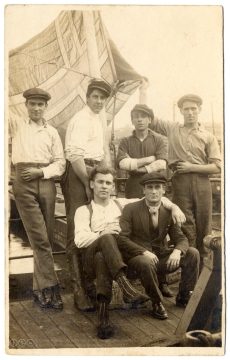
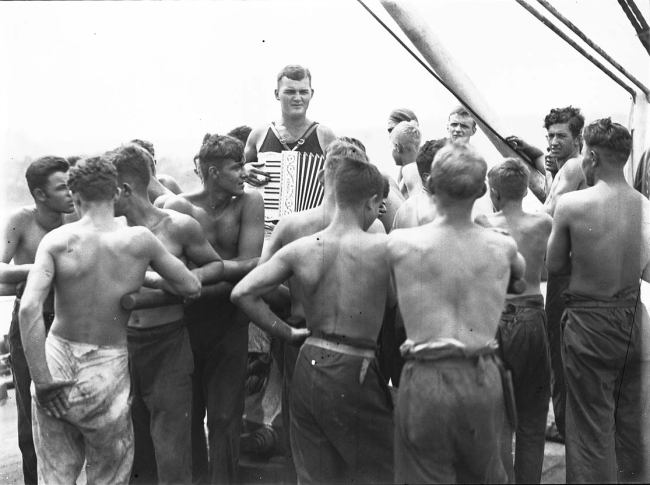
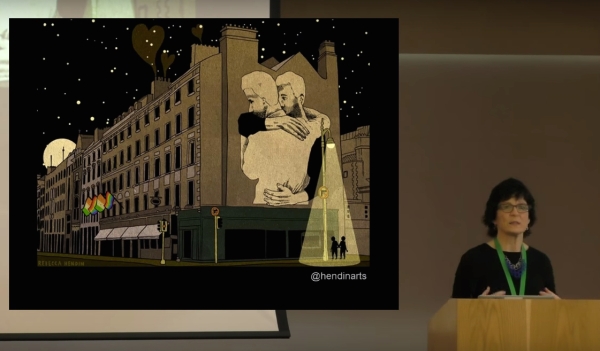


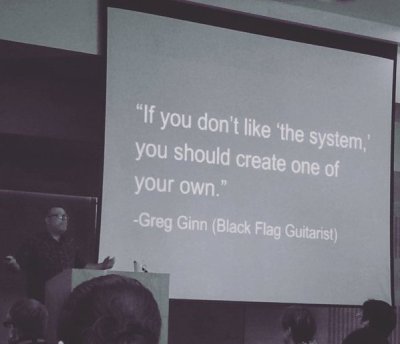
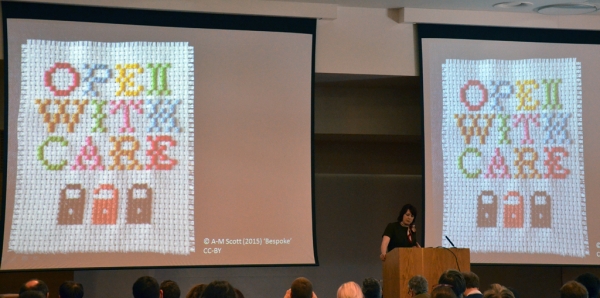
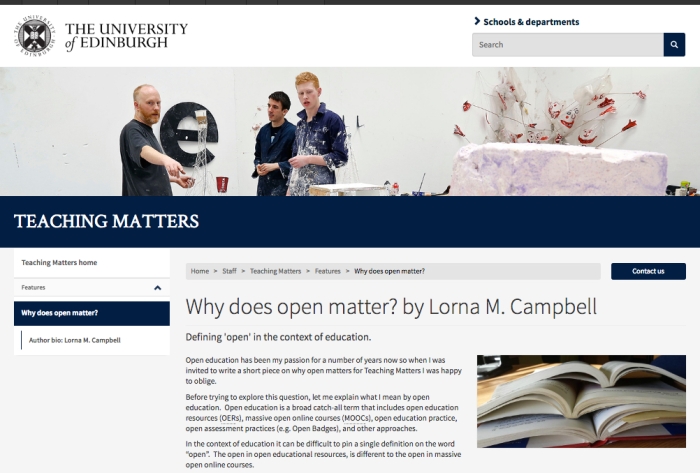
 Today is
Today is 
